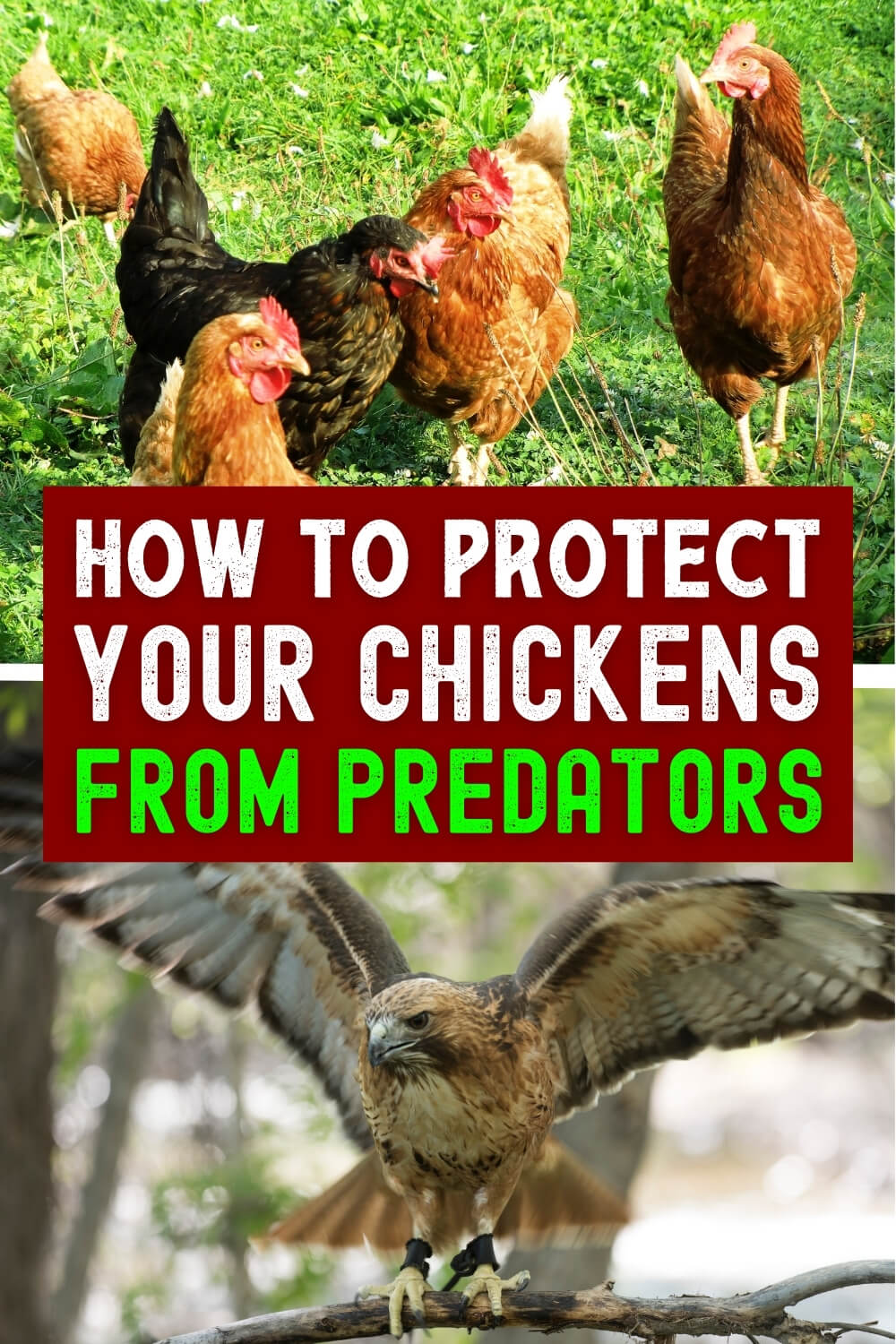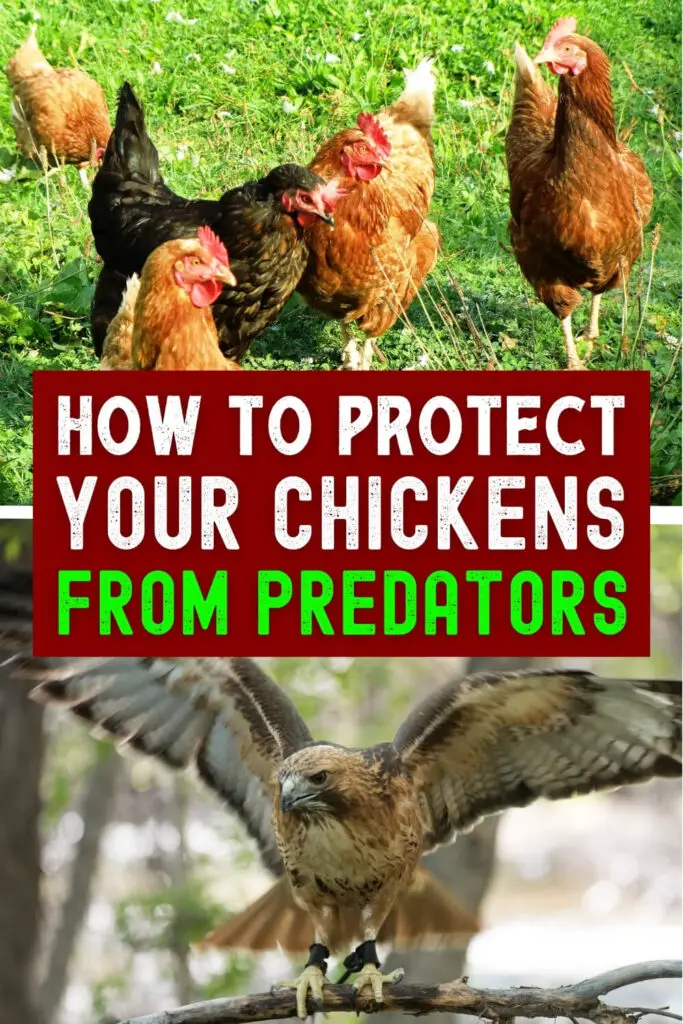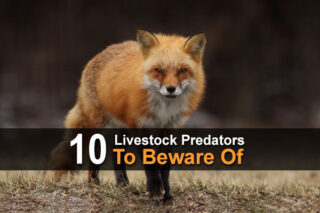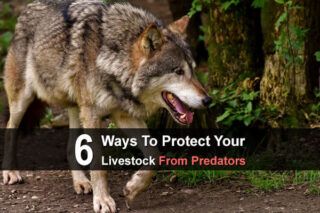Estimated reading time: 9 minutes
I didn’t think it could ever happen to me, but it did. I lost half of my flock of chickens in a vicious predator attack. It was swift, it was silent, and it happened just fifteen minutes after my family left the yard to go inside for dinner.
We were devastated by the loss of our precious hens, but sometimes, our best intentions at predator-proofing just aren’t enough and we need to do a little more work to ensure the safety of our feathered friends.
Never underestimate a hungry predator. They are smart, cunning, and determined to feed themselves and their young. They may fly, climb, dig, run, or pounce, but they will find a way to get to your chickens if they are hungry enough. Once a hungry predator discovers an easy meal on your homestead, you can be sure that it will keep coming back for more.
Your best defense against a predator attack is a strong offense – a combination of strategies to prevent an attack from happening. If you have a flock of chickens, you’ll want to protect your investment of chickens, eggs, and pets from hungry predators just waiting for a hearty meal.
Want to save this post for later? Click Here to Pin It On Pinterest!
1. Know The Enemy
In Southeastern Pennsylvania, foxes, hawks, and neighborhood dogs are some of the worst offenders when it comes to predator attacks, but raccoons and coyotes aren’t unheard of, either. In some Arizona neighborhoods, emboldened coyotes are a threat not just to chickens, but other small family pets such as cats and dogs, as well.
Get to know the most common predators in your area so you can tailor your methods of prevention to your own backyard predators.
2. Use Hardware Cloth Instead Of Chicken Wire
Chicken wire is great for keeping chickens in, but its flimsy construction does little to keep predators out. A raccoon can easily reach a paw through chicken wire to snag a hen, and larger predators are able to tear right through.
Instead, line your chicken pen and any windows or vents in the coop with hardware cloth. Quarter inch mesh is a better option for keeping predators away from your chickens.
3. Don’t Attract Predators
Keep your chicken run clean to avoid attracting unwanted predators. Leftover food and water should be taken in at night, and nearby garbage cans kept tightly closed. Leftover food and garbage can attract predatory animals such as possums, skunks, raccoons, and even rats to your chicken coop.
4. Lock Your Chickens Up In A Coop At Night
This may sound elementary, but it is true. Locking your chickens in their coop at night will protect them from night-time predators, and even people, looking to steal or kill.
A sleeping chicken is an easy target because they do not see well at night and are disoriented in the dark. Last summer, I cared for 2 rogue roosters who refused to sleep in the coop, much preferring the branches of the black walnut trees.
Although they were doing fine under the cover of the summer leaves, once the leaves began to fall in the autumn, the sleeping chickens were more exposed and became easy targets for owls.
Similarly, several chickens who preferred to sleep under the coop, where I could not reach them, became fast food for the neighborhood fox. Their unmistakable middle of the night squawk was a telltale sign that they had been caught.
5. Electric Fence
You can easily foray into the world of electric fencing with a prefabricated poultry fence. This electric netting is fairly inexpensive, easily movable, and simple to put together. Not only will it keep your chickens in, it will keep predators out.
All-in-one kits are easy to set up, and fence chargers are available with optional solar power.
6. Check For Holes In Your Coop Regularly And Repair The Immediately
Predators such as minks can squeeze their bodies through a hole as small as one inch in diameter, then go on to kill every chicken in the coop. Rats will eat baby chicks, and snakes will go for your eggs. To prevent these smaller-sized predators from entering your coop, keep a close eye for any small holes or gaps and repair them.
7. Keep Your Chickens Confined To The Safety Of A Chicken Run
Free-range chickens are much more susceptible to a predator attack than chickens kept in a pen. If you are not willing to share your birds with predators, keep them in a coop with an attached chicken run. Even friendly neighborhood dogs can be a threat to a flock of chickens, so a chicken run is your best defense against even friendly predators.
8. Bury Your Fence
Predators such as coyotes and foxes can easily dig under your chicken run fencing to get to the unsuspecting chickens inside. To discourage them from getting through, bury your fence or hardware cloth about a foot into the ground on all sides to keep them from digging underneath.
If you cannot bury your fence, a cement walkway around the perimeter, or even a walkway made from old pallets, will also discourage digging.
9. Motion Sensor Lights
Dusk and dawn are common time periods for predator attacks, and they are also times of day when you may be locking up or letting out your birds. A simple motion sensor light may be enough to ward off those unwanted predators during vulnerable times.
We hung a very basic solar powered, motion sensor light, similar to this one on our coop. It helps keep predators away, and we can easily see from the house if something has triggered the light to come on.
10. Hawk Netting
If you don’t have a roof over your chicken pen, your chickens are still open to an aerial attack. It is illegal to kill birds of prey such as hawks and owls, and the penalties are stiff, including fines and jail times. However, you can prevent aerial attacks with hawk netting, such as this one.
This creates a physical barrier that hawks won’t fly through. Some types of hawk netting add a striped visual element to the netting to make it even more discouraging to hawks. If you don’t want to purchase hawk netting, you can string fishing line across your pen in a criss-cross pattern to discourage hawks from flying into the coop.
11. Guardian Animals
LGDs, or livestock guardian dogs, are the go-to animal to protect your free-range flock. These effective guardian dogs are very protective of their animals and people, but are somewhat expensive and require extensive training.
However, if an LGD is not right for you, there are other guardian animals that you can choose from. Raise a baby goose with your flock, and it will protect them from predators, as well as raise an alarm when one gets too close.
Other unique guardian animals are donkeys and guinea hens. Guinea hens create quite a racket when any creature comes in your yard. Donkeys are naturally aggressive towards canines, and may offer protection for your homestead against coyotes and roaming dogs.
There is some evidence that crows will protect your flock from birds of prey. Crows are territorial and will naturally defend their turf from birds of prey, so attracting a few of these black beauties to your yard could be helpful.
However, hungry crows might also prey on eggs and chicks. They also have the potential to spread disease, so you may want to think twice before encouraging crows to take up residence in your area.
Of course, the most natural, faithful protector of your flock is a rooster. Some roosters can be aggressive towards people as well as predators, but a good rooster is worth keeping for his protective abilities.
12. Create Open Space Around Your Chicken Run
Predators do not like to be exposed, so if possible, create a wide open space around your chicken shelter. Predators will be less likely to choose your chickens as their prey if they have to move out in the open to do so.
13. Provide Shelter
If your chickens are free-ranging, offering them some shelter will protect them from aerial attacks. Provide bushes, small houses, or other tight places your chickens can get into where a hawk won’t follow.
14. Supervised Free-Ranging
You can further protect your flock by offering your chickens a little free ranging break from their chicken pen when you are around to supervise. Because chickens naturally return to the coop around the same time each evening, you can plan to let them out for a short period right before their return to the coop. You’ll be nearby to supervise and ward off any potential attacks.
15. Visual Deterrents
You can use a variety of visual deterrents to ward off avian predators such as hawks and owls. Stationary objects, such as scarecrows and fake owls work better if they are moved around the chicken yard every couple of days.
Otherwise, hawks and owls can become accustomed to their presence. Hang up old CD’s or other reflective materials around your yard to flash in the sunlight to startle hawks and interrupt any potential attacks.
16. Be Active
Your presence can be a great deterrent to predators. Being active around your chicken coop will make predators aware that humans are nearby. Even the smell of your scent after you are gone may be enough to discourage a more timid predator from coming for your chickens.
17. Predator Urine
This controversial deterrent can be purchased online. The theory is that predatory animals will mark their territory to warn others to stay away. Spreading wolf or coyote urine around your coop and run would supposedly keep away other wolves and coyotes. Some homesteaders swear by this less-than-appealing defense, while others do not believe it works.
18. Secure Feed and Feeders
It might seem unrelated, but unsecured feed can be a major predator magnet. Spilled grain or feed left out overnight not only attracts rodents, but also larger predators like raccoons, skunks, and opossums looking for an easy meal.
Use gravity-fed or treadle feeders that close when not in use, and always store bulk feed in sealed metal containers. A clean feeding area is a safer one.
19. Install a Game Camera
Sometimes the best way to fight back is to know exactly what you're dealing with. Installing a game or trail camera near your coop can help you identify what predators are lurking around at night.
Once you know who the culprit is, you can tailor your defense strategies more effectively. Plus, it can offer peace of mind, or a wake-up call, when you see what's been prowling while you sleep.
20. Coop Door Automation
Life gets busy, and it's easy to forget to lock up the coop at night. Investing in an automatic coop door can be a game-changer. These doors open and close on a timer or with the rising and setting sun, ensuring your flock is safely tucked in no matter your schedule. It’s a small investment that could save your entire flock from a nighttime predator attack.
Like this post? Don't Forget to Pin It On Pinterest!
You May Also Like:











